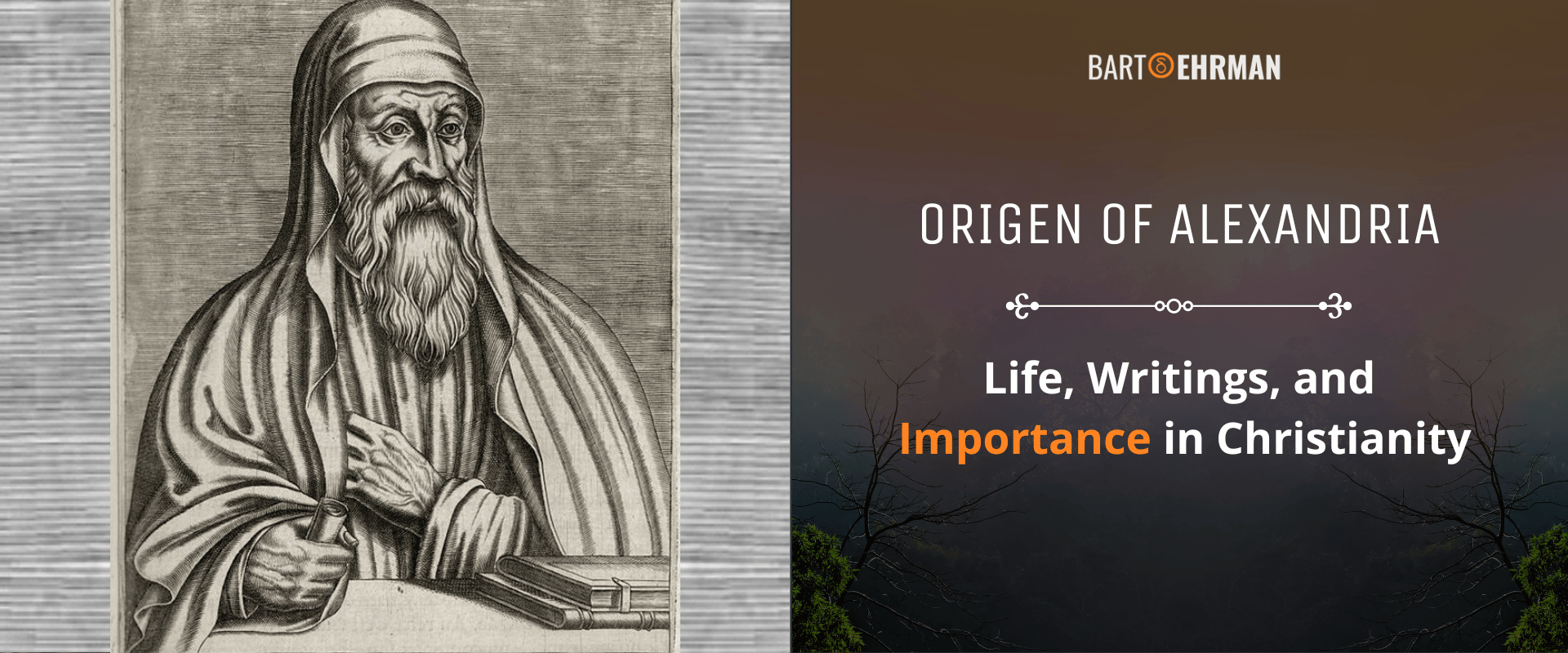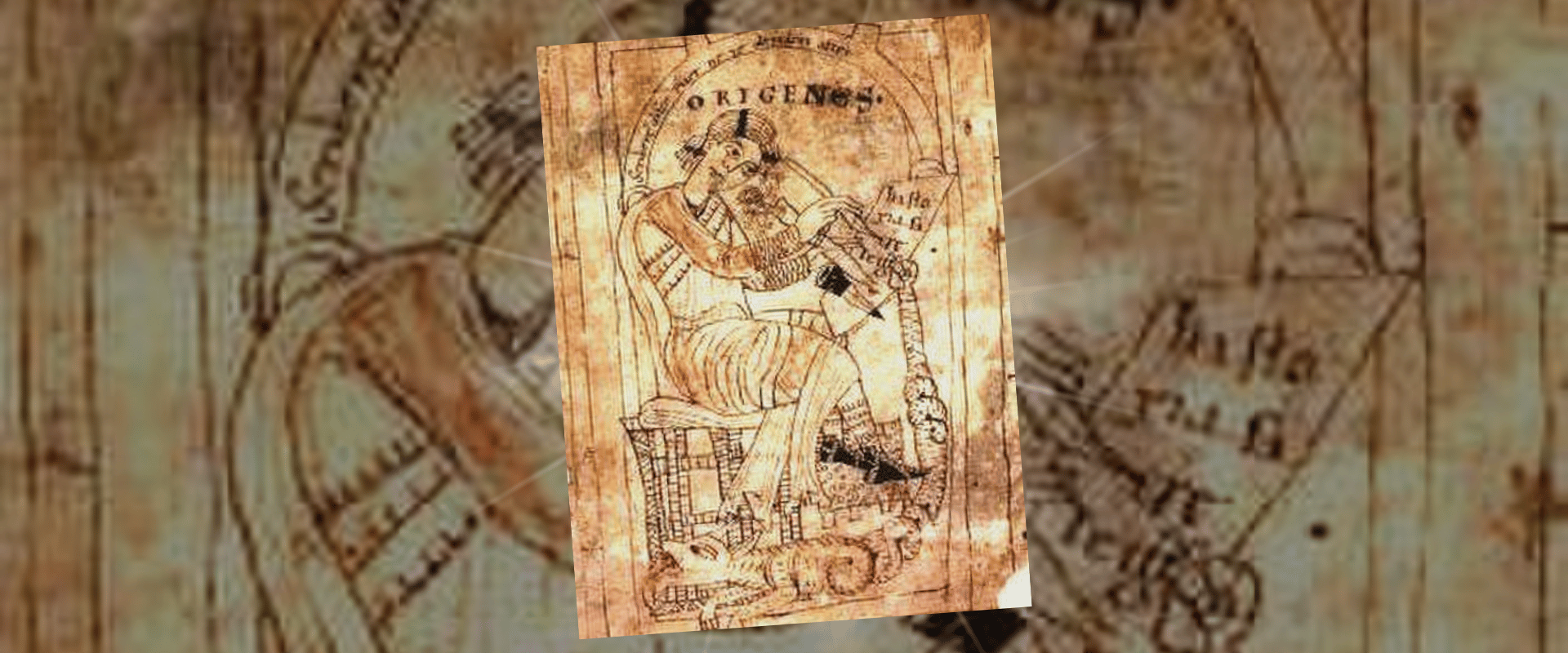Origen of Alexandria: Life, Writings, and Importance in Christianity

Written by Marko Marina, Ph.D.
Author | Historian | BE Contributor
Verified! See our guidelines
Verified! See our editorial guidelines
Date written: July 15th, 2024
Disclaimer: The views and opinions expressed in this article belong to the author and do not necessarily match my own. - Dr. Bart D. Ehrman
Many of my Christian friends are intrigued and attracted by the concept of reincarnation, even though it doesn't align with the core beliefs of most contemporary Christian denominations. Despite this, they often ask me if early Christians entertained such ideas.
While there isn’t a straightforward example of the belief in reincarnation in early Christianity, one prominent figure came remarkably close. His name was Origen.
Origen of Alexandria (c. 185-254) was a towering intellectual in early Christianity, a theologian and philosopher whose ideas profoundly impacted Christian thought. Living in the 3rd century, he was a pioneering scholar, philosopher, and theologian who sought to reconcile Greek philosophy with Christian doctrine.
His works, though sometimes controversial, contributed significantly to the development of Christian theology and biblical exegesis (the interpretation of texts).
In this article, we’ll delve into Origen's life, explore his major works, and discuss his significance and lasting impact on Christianity. By examining his biography and contributions, we can better understand the complex and often contentious role he played in shaping early Christian thought.
The Christian tradition is filled with great and important figures. So, before we begin our exploration of Origen's life and legacy, I want to invite you to check out the online course “Paul and Jesus: The Great Divide” by Dr. Bart D. Ehrman.
In this course, Dr. Ehrman analyzes two pivotal figures of Christianity, highlighting their similarities but more often their surprising differences! Dive deeper into the fascinating contrasts between Paul and Jesus and enhance your understanding of early Christian thought.

Origen of Alexandria: Biography
Origen was born around 185 C.E. into a Christian family in Alexandria, Egypt, one of the largest and most culturally diverse cities of the ancient world.
Alexandria was a melting pot of philosophical streams and cultural influences, and the Christian Church itself was far from homogeneous. Notable Gnostic teachers like Basilides and Valentinus also hailed from this vibrant city.
Origen's father, Leonides, was martyred during the Severan Persecution of 202-203 C.E., a tragic event that profoundly affected the young Origen.
Eusebius recounts that Origen was determined to join his father in martyrdom, but his mother, in a desperate attempt to save him, hid his clothes to keep him at home. After Leonides' death, the imperial authorities confiscated the family’s property, leaving Origen, at seventeen, responsible for his mother and six younger siblings.
Thanks to the generosity of a wealthy Christian woman, Origen briefly continued his studies. Despite the challenges, Origen's intellectual prowess blossomed. Of Greek ancestry, he was fluent in Greek and one of the few early church fathers to master Hebrew.
Joseph W. Trigg, in his Biography of Origen, highlights Origen's comprehensive education: “Origen clearly mastered the standard Hellenistic curriculum: the study of Greek literature along with mathematics and astronomy. His command of Scripture, likewise remarkable, also bespeaks a familiarity nourished from childhood.” (Affiliate Disclaimer: We may earn commissions on products you purchase through this page at no additional cost to you. Thank you for supporting our site!)
One episode from his life shows how profound Origen’s commitment to Christianity was. Eusebius informs us that he took the evangelical instructions so seriously that he acted on a verse from Matthew 19:12:
“For there are eunuchs who were born that way, and there are eunuchs who have been made eunuchs by others – and there are those who choose to live like eunuchs for the sake of the kingdom of heaven. The one who can accept this should accept it.”
Believe it or not, Origen of Alexandria, in his youthful zeal, took this verse literally and underwent the described operation, an act that French scholar Henri Crouzel finds intriguing given Origen's reputation as “the prince of allegory.” Perhaps, it was precisely a youthful zeal to blame since Origen did, indeed, in his later years, become known as a great allegorist.
Origen left Alexandria in the early 230s during a dispute with his bishop, Demetrius. He then took up permanent residence in Palestinian Caesarea among bishops who highly valued his biblical interpretation. This wasn’t Origen's first visit to Caesarea Maritima; he had been there on previous occasions.
One of the causes of the conflict emerged when Bishop Demetrius criticized Origen for being allowed to preach during his earlier visit without being ordained as a priest.
To make it easier to understand Origen's life and contributions, here are some key dates highlighting significant moments. The table below is mostly based on information from Eusebius.
Date | Event |
|---|---|
185-186 C.E. | Birth of Origen: Origen is born in Alexandria, Egypt. |
202 C.E. | Martyrdom of Leonides: Origen's father is martyred during the persecution by Septimius Severus, and Origen, about 17 years old, assumes responsibility for his family. |
C. 231 C.E. | Move to Caesarea: Origen leaves Alexandria and settles in Caesarea of Palestine, marking a significant shift in his life and work. |
254-255 C.E. | Death of Origen: Origen dies at the age of 69, likely under the reign of Valerian, after suffering from torture during the Decian persecution. |
C. 400 C.E. | Condemnation at the Synod of Alexandria: Origen's teachings are condemned, marking the beginning of the Origenist Controversy. |
In his book “Griechische Kirchenväter” (“Greek Church Fathers”), Hans von Campenhausen notes:
“Despite all his peacefulness and personal humility, Origen ultimately couldn’t give the office of the bishop the importance it claimed for itself.” (my translation)
In any case, Origen found his new residence in Caesarea Maritima — a city founded by King Herod as his Greek capital, which housed a major library of Greek and Hebrew texts. It was in Caesarea that Origen produced most of his extensive body of work.
In his later years, Origen's influence continued to grow, but so did the controversies surrounding his teachings. He traveled widely, engaging in theological debates and spreading his ideas. Unfortunately, persecution marked his later life.
During the Decian persecution around 250 C.E., Origen was imprisoned and tortured. He survived these ordeals, but his health was irreparably damaged, leading to his death a few years later, around 253-254 C.E.
Origen: Major Works
Were he to teach on a modern theological faculty, Fred Norris observed, Origen would probably be a professor of the Old Testament, but one with so many interests in all the theological disciplines that, in essence, he would be a faculty in himself, yet more missionary, holistic, and helpful than many.
Undoubtedly, Origen was a prolific writer and an even greater intellectual. What follows is a list of his major works and short descriptions.
FREE COURSE!
WHY I AM NOT A CHRISTIAN
Raw, honest, and enlightening. Bart's story of why he deconverted from the Christian faith.
Over 6,000 enrolled!
Hexapla
Christopher Markschies, in his book “Origenes und sein Erbe” (“Origen and His Legacy”), situates this work in the second decade of the 3rd century, when Origen began an extensive amount of preparatory work to place Old Testament commentary on a solid philological foundation.
The Hexapla, or “Six Books,” contains the Hebrew text, the Hebrew text transliterated into Greek letters, and the four most important Greek translations of the Hebrew Bible — including the Septuagint — as well as commentaries on how these texts relate to the New Testament.
Here, Origen of Alexandria created the official biblical typology and identified passages in the Old Testament that prefigure the New Testament, which is used to this day. This work is evidence of his great influence on biblical scholarship.
On First Principles
Origen’s greatest contribution to Christian theology was a work he wrote early in his career, On First Principles. This work was controversial not only because of its views but because it exists only in fragmentary form. The first three books have been reconstructed fairly accurately, while the later books are more questionable.
In this book, Origen refined the language of analysis, which became the hallmark of Christian exegesis. He emphasized the importance of understanding the inner (allegorical) meaning, not just the literal meaning, of the text.
Furthermore, this work contains the first clear explanation of the creation of the Godhead, as well as discussions of the nature of evil that borrow heavily from Plato concluding that evil is, first and foremost, the absence of good.
Additionally, Origen stressed the importance of free will in achieving salvation, describing it as the process of moving the soul back toward God. This idea would bring him close to a modern concept of reincarnation, as we’ll explore later in the article.
Against Celsus
In Against Celsus, Origen offers a robust defense of Christianity against the criticisms of the pagan philosopher Celsus. To put it more bluntly, this work represents the culmination of early Christian apologetics.
In his translation of Against Celsus, Henry Chadwick points out: “Origen does not merely vindicate the character of Jesus and the credibility of the Christian tradition; he also shows that Christians can be so far from being irrational and credulous illiterates such as Celsus thinks them to be that they may know more about Greek philosophy than the pagan Celsus himself, and can make intelligent use of it to interpret the doctrines of the Church.”

Commentary on John’s Gospel
In this work, Origen produced what Ronald E. Heine describes as “the greatest exegetical work of the early Church.” This commentary showcases Origen's profound understanding of scripture and ability to draw deep theological insights from the text, thus significantly shaping subsequent Christian thought and exegesis.
Origen of Alexandria approached John's Gospel with a meticulous and innovative method, combining literal, moral, and allegorical interpretations to uncover the multi-layered meanings within the text. His work on John's Gospel not only illuminated the theological depths of the scripture but set a high standard for future biblical commentaries.
One of the saddest aspects of Origen's career is that so little of his remarkable work has reached us. In his second volume of Patrology, German scholar Johannes Quasten noted that of 574 homilies known to us, only 20 in Greek and others in Latin are extant. Fully 388 are lost.
The decision not to copy them because of the Origenist Controversy (theological disputes and condemnations surrounding Origen's teachings that emerged after his death) leaves us without many insights into Christian spirituality and philosophy. What was the controversy all about? To learn that, we need to delve deeper into Origen's theology and influence. To this, we turn our attention now.
Origen’s Theology and Influence
When observing Origen in his work as a philosopher, it becomes clear that the starting and ending point of his theology is the interpretation of biblical texts. His “system,” which lies behind all texts and is partially developed in his main work On First Principles, is the result of a vigorous attempt to interpret biblical texts so they can provide educated contemporaries with a convincing account of God, humanity, sin, and salvation.
Origen accepted the identification of Christ with the Logos (1:1) in John's Gospel — "the Word," but, more precisely, the rational Word of creation. According to Origen, the Christ-Logos was eternally created by the Father.
He believed that God the Father, the Christ-Logos, and the Holy Spirit represented three aspects of the Godhead and stood in a hierarchical relationship to one another. The image he used is that of an eternal torch, one of which illuminates the other.
In the 4th century, serious debates arose over Origen’s view of the Trinity. Did he mean a hierarchy of emanations — that is, the Father generated the Son, who in turn generated the Holy Spirit — or are they coequal and coeternal?
So, Origen of Alexandria set up the intellectual framework for debates that would unfold at the Council of Nicaea and the Council of Constantinople, influencing theological discussions for the next century.
Moreover, despite his dependence on Platonic thought, Origen was, first and foremost, a Christian who knew Hebrew texts very well. Consequently, he had a strong sense of the transcendence of God. For him, the Christ-Logos was the bridge between divinity and the material world or, in Platonic terms, from the world of being to the world of becoming.
Furthermore, Origen believed souls are eternal and inherently good, yet they possess free will. The first three books of On First Principles spend a great deal of time explaining how souls fell away from God.
They are divine, but because they have free will, they become inattentive and fall away from God like a charioteer who falls asleep at the reins — an image taken from Plato’s work Phaedrus. However, Origen posited that all souls, through knowledge and faith, can return to God.
Did You Know?
Origenist Controversy
Did you know that Origen's teachings sparked a significant disagreement in early Christianity, known as the Origenist Controversy? This theological conflict, which spanned from the 4th to the 6th centuries, centered around some of Origen's more unconventional ideas. His views on the pre-existence of souls, the nature of the Trinity, and the concept of universal salvation were seen as contentious by some influential individuals such as St. Augustine.
The controversy reached its peak when Origen's teachings were condemned at several church councils, including the Synod of Alexandria in 400 and the Synod of Constantinople in 543. The conflict culminated in the Second Council of Constantinople in 553, where Origen’s views were officially anathematized.
Origen’s theology, therefore, borders on the concept of reincarnation, suggesting a cyclical view of souls falling away and returning to God. He thought that if souls could fall away from God and re-attain perfection once, perhaps they could fall away again.
This notion implies a cyclical pattern of existence, deviating from the linear progressive time of the Hebrew tradition and moving toward a Greek philosophical (circular) sense of time.
In this scheme, no soul is condemned to hell for eternity; punishment is the soul contemplating and remembering its evil acts with remorse, thereby perceiving God and attaining divinization. Through these assumptions, Origen could argue for the universalism of salvation.
In his universalist view, while sinners would go to hell, hell was envisioned only as a temporary stage for purification before entrance into heaven.
As Brian E. Daley explains in his book The Hope of the Early Church:
“Behind this conviction that all punishment is ultimately medicinal and educational stands the equally strong conviction that all human souls will ultimately be saved and will be united to God forever in loving contemplation. For Origen, universal salvation is an indispensable part of the 'end' promised by Paul in I Cor 15.24-28, when Christ will destroy all his enemies, even death, and hand over all things in 'subjection' to his Father, who will be 'all in all’.”
Undoubtedly, Origen’s theological contributions significantly influenced early Christian thought, setting the stage for future doctrinal developments and debates.
Origen of Alexandria: His Everlasting Impact
Christoph Markschies rightly notes:
“Origen is a theologian of revelation, insofar as divine revelation represents the highest norm for him and is accessible to humans through the methodically secured understanding of biblical texts... He is also a hermeneutical theologian, as he methodically attempts to overcome the temporal distance between his present and the biblical texts through a theory of multiple senses of Scripture.” (my translation)
In Origen, early Christian thought gained an intellectual and philosophical giant whose contributions significantly shaped the development of Christian theology and philosophy.
One of Origen's notable achievements was his meticulous work with the Hebrew Bible. He determined the most accurate Greek version of the Old Testament, a crucial task for later Christian thinkers who did not know Hebrew and relied heavily on his scholarship.
This foundational work ensured that Christian biblical interpretation had a solid, reliable basis, which was essential for theological consistency and development.
Perhaps Origen's most important contribution was his synthesis of Platonic reasoning and philosophy with Christian doctrine. By integrating Platonic ideas into Christian theology, Origen helped bridge the gap between pagan and Christian intellectual traditions.
Christians were no longer as divided as they had been and could present themselves as the legitimate heirs of Plato. This alignment with classical tradition was vital in the ancient world, where respect for tradition was paramount, and new ideas often faced skepticism.
Origen's efforts provided Christian thinkers with a coherent religious vision and robust intellectual arguments to support their beliefs. His work allowed Christianity to be seen as a serious and intellectually credible tradition, capable of standing alongside the philosophical systems of the time.
Through Origen, early Christianity gained not only theological depth but a respected place in the ancient world’s broader intellectual landscape.
Conclusion
Origen of Alexandria stands as a monumental figure in early Christian thought, whose intellectual legacy continues to influence theological discourse. His rigorous approach to biblical exegesis and his efforts to integrate Greek philosophy with Christian doctrine provided a robust foundation for future theological developments.
Despite the controversies surrounding his teachings, particularly the Origenist Controversy that spanned the 4th to 6th centuries, Origen's influence is undeniable. His belief in the eventual return of all souls to God, a notion that borders on reincarnation challenged the Judeo-Christian linear view of time and salvation.
This universalist perspective, where punishment serves as a temporary stage for purification rather than eternal damnation, offers a more compassionate and hopeful vision of salvation.
Finally, Origen's dedication to understanding and interpreting the divine through scripture and prayer highlights his profound commitment to faith and reason, thus underscoring his lasting impact on the Christian tradition.
FREE COURSE!
WHY I AM NOT A CHRISTIAN
Raw, honest, and enlightening. Bart's story of why he deconverted from the Christian faith.
Over 6,000 enrolled!
